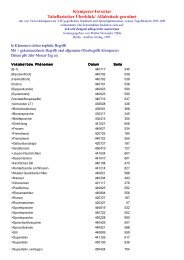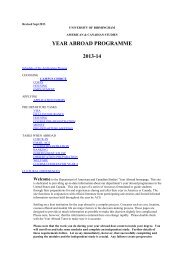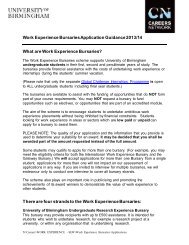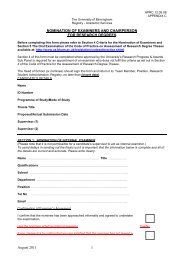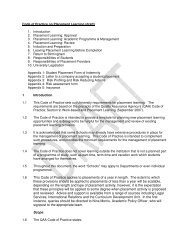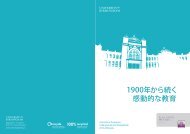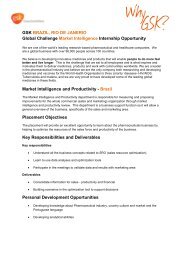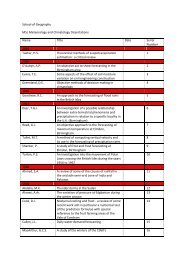PD MED News Birmingham Clinical Trials Unit Parkinson's Disease ...
PD MED News Birmingham Clinical Trials Unit Parkinson's Disease ...
PD MED News Birmingham Clinical Trials Unit Parkinson's Disease ...
You also want an ePaper? Increase the reach of your titles
YUMPU automatically turns print PDFs into web optimized ePapers that Google loves.
<strong>Birmingham</strong> <strong>Clinical</strong> <strong>Trials</strong> <strong>Unit</strong><br />
<strong>Parkinson's</strong> <strong>Disease</strong> <strong>News</strong>letter<br />
<strong>PD</strong> <strong>MED</strong> <strong>News</strong><br />
November 2008<br />
<strong>PD</strong> <strong>MED</strong> is a large, simple, 'real life' trial that aims to determine more reliably which<br />
class of drug provides the most effective control, with the fewest side-effects, for both<br />
early and later <strong>Parkinson's</strong> <strong>Disease</strong>.<br />
Randomisation to both Early and Later disease arms<br />
will remain open until December 2009!<br />
Randomisation to <strong>PD</strong> <strong>MED</strong> will remain open for one final year to allow the target recruitment for the<br />
later disease randomisation to be met and to enhance statistical power for the early disease<br />
randomisation. People with <strong>PD</strong> live for an average of 15 years with their disease, therefore, long-term<br />
follow-up of the <strong>PD</strong> <strong>MED</strong> randomised cohort will be required to assess reliably the relative clinical and<br />
cost-effectiveness of different classes of medication for <strong>Parkinson's</strong> disease: first results of the<br />
randomised comparisons are not expected before 2010 with a full HTA report in 2011. Continuing<br />
recruitment for an additional year will significantly enhance the sample size, will not delay<br />
publication - patients randomised in 2009 will have 2 years of follow-up by 2011 - and will enhance<br />
data on the newer preparations, thus increasing the clinical relevance of the study findings.<br />
As highlighted by NICE, the questions addressed by <strong>PD</strong> <strong>MED</strong> remain the top research priorities in<br />
treatment of <strong>PD</strong>. Continuing recruitment will provide an opportunity for centres to continue contributing<br />
to the evidence base by randomising their patients rather than having to make non evidence-based<br />
treatment decisions. The recruitment extension should not be administratively burdensome for centres<br />
as the <strong>PD</strong> <strong>MED</strong> Study Office will submit the relevant paperwork details.<br />
Save the date in your diary!<br />
<strong>PD</strong> Collaborators' Meeting<br />
18 - 19th May 2009<br />
The meeting will again be held at the Jurys Inn<br />
and Botanical Gardens in <strong>Birmingham</strong>. The<br />
programme will include updates on <strong>PD</strong> SURG<br />
and the launch of <strong>PD</strong> REHAB (our new trial<br />
investigating the potential benefits of<br />
physiotherapy and occupational therapy for<br />
<strong>PD</strong> patients).<br />
<strong>PD</strong> <strong>MED</strong> is funded by the NHS through its Health Technology Assessment<br />
Research Programme. It is supported by the <strong>Parkinson's</strong> <strong>Disease</strong> Society, the<br />
European <strong>Parkinson's</strong> <strong>Disease</strong> Association and the <strong>Parkinson's</strong> <strong>Disease</strong><br />
Specialist Nurse Association<br />
<strong>PD</strong> <strong>MED</strong> team: Cally Rick / Francis Dowling (0121) 415 9129 / 9127
<strong>PD</strong> <strong>MED</strong> Recruitment<br />
2008 has seen the best ever recruitment to <strong>PD</strong> <strong>MED</strong>.<br />
This recent surge in recruitment has been centred in<br />
regions of the UK supported by DeNDRoN.<br />
We are hoping that the Comprehensive Research<br />
Network will have a similar impact on recruitment in<br />
other regions.<br />
If you need any help getting in touch with your<br />
local research network, please let us know.<br />
By the end of October, 1,791 patients<br />
had been randomised into <strong>PD</strong> <strong>MED</strong>:<br />
1,374 into the early and 417 into the later<br />
disease randomisation of the trial including<br />
30 re-randomisations.<br />
45 participants were recruited from overseas centres.<br />
<strong>PD</strong> GEN - A DNA Bank<br />
<strong>Birmingham</strong> University will be closed for Christmas. Please do<br />
not send <strong>PD</strong> GEN samples from 10th December to 2nd January.<br />
We are starting to see an increase in recruitment to the other studies in the <strong>PD</strong> portfolio as DeNDRoN<br />
LRNs have come on line. Only a small proportion of <strong>PD</strong> <strong>MED</strong> and <strong>PD</strong> SURG patients have contributed<br />
samples to <strong>PD</strong> GEN. If you are in an area that is covered by a DeNDRoN LRN, they can provide<br />
support to enroll <strong>PD</strong> <strong>MED</strong> and <strong>PD</strong> SURG patients<br />
into <strong>PD</strong> GEN. We hope that this support will extend<br />
across the country once the CRNs get up and<br />
running.<br />
Entering patients into <strong>PD</strong> GEN is a simple process,<br />
patients and carers (where possible) are<br />
consented for <strong>PD</strong> GEN and then asked to<br />
complete a quick questionnaire and provide a<br />
small blood sample. Recruitment in to <strong>PD</strong> GEN<br />
will continue until 2011, so there is plenty of time f<br />
or new centres (enrolled in the <strong>PD</strong> <strong>MED</strong> or<br />
<strong>PD</strong> SURG trials), to join <strong>PD</strong> GEN.<br />
If you would like any information about<br />
<strong>PD</strong> GEN or who to contact at DeNDRON to<br />
find out what support is available in your area,<br />
please contact Francis Dowling on<br />
0121 415 9127 or pd-trials@bham.ac.uk.<br />
Samples<br />
250<br />
200<br />
150<br />
100<br />
50<br />
0<br />
2002 2003 2004 2005 2006 2007 2008<br />
Year<br />
Carer<br />
Patient
<strong>PD</strong> SURG NEWS<br />
November 2008<br />
The first draft of the <strong>PD</strong> SURG paper is currently being reviewed<br />
by the writing committee, It should be submitted before<br />
the end of the year.<br />
A report of the <strong>PD</strong> SURG 1-year results is currently being prepared by the writing committee. It will be<br />
circulated to <strong>PD</strong> SURG Collaborators for comment prior to submission to the New England Journal of<br />
Medicine later this year.<br />
We are continuing to collect data from the later time points in the trial and 2-year assessments should<br />
be available for all participants by the end of the year. The later follow up will provide a unique<br />
understanding of the longer term effects of DBS surgery. However, the form return rate has not been as<br />
good at later time points. There is still an opportunity, though, to improve the return rates significantly so<br />
please do keep sending us the annual forms. If an assessment is missed, it is particularly important for<br />
the statistical analyses to obtain data from the next assessment. If you are unable to see a patient in<br />
clinic at the annual follow up time point, can you please let us know so that we can send the<br />
questionnaires to the participants directly?<br />
<strong>PD</strong>Q 39 (primary end point)<br />
AssessmentDesc PercNow PercOverall<br />
Baseline 97 97<br />
1 Year 88 88<br />
2 Year 83 75<br />
3 Year 67 50<br />
5 Year 63 20<br />
Euroqol<br />
AssessmentDesc PercNow PercOverall<br />
Baseline 97 97<br />
1 Year 88 88<br />
3 Year 64 48<br />
5 Year 63 20<br />
U<strong>PD</strong>RS AssessmentDesc PercNow PercOverall<br />
AssessmentDesc PercNow PercOverall<br />
Baseline 98 98<br />
1 Year 85 85<br />
3 Year 58 43<br />
5 Year 50 16<br />
Annual FU*<br />
AssessmentDesc PercNow PercOverall<br />
1 Year 89 89<br />
3 Year 65 49<br />
5 Year 60 19<br />
6 Month Post-Op 1 86 77<br />
Resource Usage<br />
AssessmentDesc PercNow PercOverall<br />
1 Year 84 84<br />
2 Year 61 55<br />
3 Year 67 49<br />
5 Year 69 22<br />
SF 36 (Carer QoL)<br />
Baseline 96 96<br />
1 Year 79 79<br />
2 Year 82 76<br />
3 Year 56 43<br />
5 Year 62 20<br />
*Some of these data can be obtained post hoc from medical records (Ann FU and 6 month post<br />
op forms).<br />
There are enough participants who have not yet reached the later time points for the return rates to<br />
improve significantly. We will be performing longitudinal repeated measures analysis - so even if you<br />
miss one time point, please keep filling out the forms as the data will be used.<br />
For more information please contact: Cally Rick c.e.rick@bham.ac.uk
<strong>PD</strong> REHAB <strong>News</strong><br />
November 2008<br />
<strong>PD</strong> REHAB <strong>PD</strong> REHAB<br />
A Randomised Controlled Trial to Assess the <strong>Clinical</strong>- and Cost-Effectiveness of Physiotherapy and<br />
Occupational therapy in <strong>Parkinson's</strong> <strong>Disease</strong>.<br />
The National Institute of Health Research has agreed funding for <strong>PD</strong> REHAB, a randomised controlled<br />
trial to assess the clinical- and cost-effectiveness of Physiotherapy and Occupational Therapy in<br />
<strong>Parkinson's</strong> disease. <strong>PD</strong> REHAB compares the immediate and prolonged (12 months post treatment)<br />
effects of domiciliary Occupational Therapy (OT) and Physiotherapy (PT) relative to no treatment.<br />
Inclusion Criteria Exclusion Criteria<br />
Idiopathic <strong>PD</strong> as defined by the UK <strong>PD</strong>S Dementia as usually defined clinically by the<br />
Brain Bank Criteria. patient's physician.<br />
Any <strong>PD</strong> patient who reports limitations Received OT in the last two years or PT in the<br />
in Activities of Daily Living last one year.<br />
The investigator is uncertain that the patient<br />
will require OT and/or PT during the 15 months<br />
of the trial.<br />
The relative effectiveness of PT and OT will be measured by the participant's assessment of their quality<br />
of life, at baseline, 3, 9 &15 months. This will assess whether there has been a meaningful change in<br />
quality of life for the participant, immediately after therapy and, if so, if the effect is maintained 6 and 12<br />
months later.<br />
Resource usage, adverse events and carer quality of life will also be measured, to allow the calculation<br />
of not only the effectiveness but the cost effectivensss of therapy.<br />
<strong>PD</strong> REHAB Projected Timetable<br />
Time Action<br />
September 2008 NRES application for trial submitted<br />
December 2008 NRES approval obtained and protocol published<br />
January 2009 Trial officially commences with HTA<br />
Trial Manager and Data Manager appointed<br />
February 2009 Applications for SSA and R & D approval<br />
onwards<br />
submitted<br />
May 2009 Trial launch meeting with collaborators (#1)<br />
July 2009 Recruitment commences in ‘start up’ centres<br />
January 2010 All 40+ centres recruited<br />
May 2010 Collaborators’ meeting (#2)<br />
July 2010 All centres recruiting<br />
May 2011 Collaborators’ meeting (#3)<br />
July 2012 Recruitment completed<br />
October 2012 Last patient completes treatment<br />
October 2013 Last patient completes 15 month follow up<br />
Data analysis commences<br />
December 2013 Results available<br />
HTA report written<br />
Paper submitted for publication<br />
Final collaborators’ meeting (#4)<br />
The Trial Launch Meeting will be held on the 18th May at the Botanical Gardens In <strong>Birmingham</strong><br />
If you would like any further information about this trial, please contact:<br />
Carl Clarke - c.e.clarke@bham.ac.uk, Cath Sackley - c.m.sackley@bham.ac.uk<br />
Cally Rick - c.e.rick@bham.ac.uk


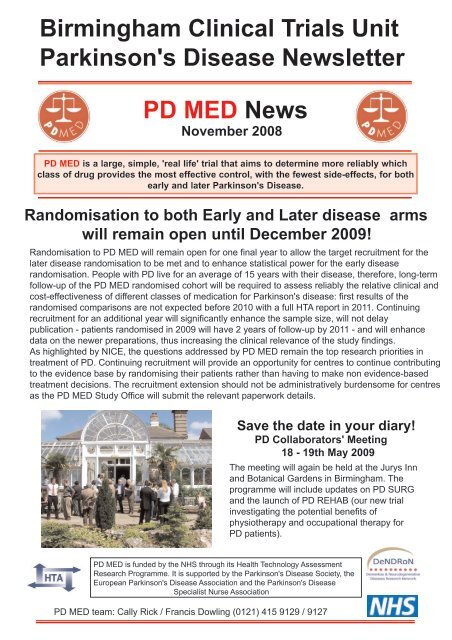
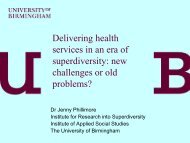
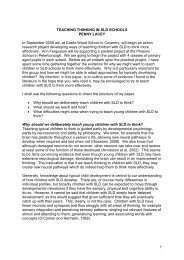
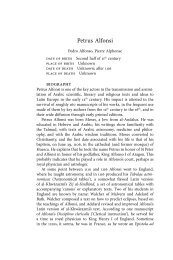
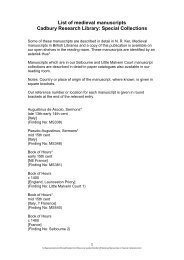
![Benyamin Asadipour-Farsani [EngD Conference abstract]](https://img.yumpu.com/51622940/1/184x260/benyamin-asadipour-farsani-engd-conference-abstract.jpg?quality=85)

